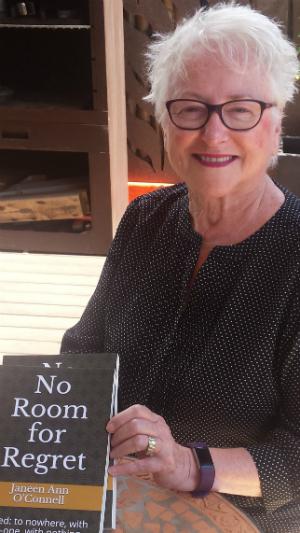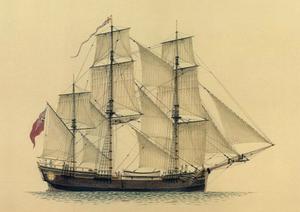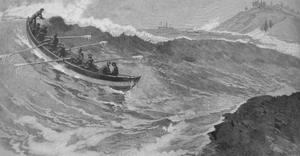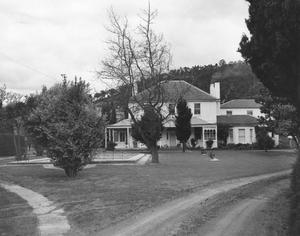When a Melbourne retiree started the online Diploma of Family History at the University of Tasmania she had no inkling that her own connection to the island state would be revealed.

The author with her first book.
Former teacher Janeen O’Connell had always had a penchant for family history, but there was one branch of the family that she hadn’t investigated.
“I was doing a unit at UTAS called Writing the Family Saga,” explains Janeen. “We were asked to identify an ‘ancestral roadblock’, and we had to find a strategy for breaking that impasse.” Janeen had come across a newspaper clipping that mentioned an Elizabeth Blay who married a David Francis McBeath.
“The clipping mentioned that they were from Tasmania, says Janeen, “but I had no idea that I had family in Tasmania.”
With a wealth of historical material at her disposal and armed with new techniques, she soon made discoveries.
It’s just about knowing where to look. You can sit in front of Ancestry.com for days; there are always lots of people with the same names and surnames. You need to go through things step by step in a structured way, or you waste so much time.
Colourful characters
Janeen learned that she had a First Fleet ancestor on her grandfather's side, James Bryan Cullen who arrived on Scarborough in 1788, having been convicted of theft at the Old Bailey and sentenced to seven years of transportation.
In 1790, along with 182 other convicts, he was moved to Norfolk Island by Governor Phillip’s order.
In 1796 a girl from Dublin, Elizabeth Bartlett, was transported on the Marquis Cornwallis. She too was moved to Norfolk Island, and arrived there pregnant. The pair later married, despite her condition and an age difference of decades. They spent seventeen years building a life on the island.

Scarborough Transport ship, painting by marine artist Frank Allen.
In 1807, when Cullen was 65, the couple was sent to Van Diemen’s Land (the name by which Tasmania was then known) as free settlers. They built a stately home on the banks of the River Derwent, upstream from Hobart.
Difficult lives
The records showed births and deaths – many of
young children – and they also hinted at unfair convictions for two of Janeen's convict ancestors. Above all, what Janeen discovered suggested tumultuous lives, in which people were the victims of circumstance and at the
mercy of authority.
Despite this, the family managed to live productive lives, though their contribution to the early development of Van Diemen’s Land had been largely forgotten because of a culture of shame around convict roots. As she explained to the ABC in a recent interview, Janeen experienced that silence first-hand:

An engraving shows convict settlers arriving on Norfolk Island.
No one in the family knew anything about any of them. I can remember asking my grandfather when we were doing it at school if we had convicts in the family and he said ‘no, no, no.’ I wonder how he’d feel about it now.
At the time of his death in 1821 Cullen’s property was heavily in debt. The coroner’s inquest ruled that his death, aged 79, was by a self-inflicted gunshot wound, ruled accidental.
A novelist is born

The Cullens' home (later called Glen Derwent), as seen in 1966. Courtesy of the Wishaw Collection.
When Janeen submitted the results of her investigation as part of an assignment, the feedback she received got her thinking. “My lecturer, Dr Jodi McAlister, said ‘This story needs to be told: you need to develop it further’. And so, 77,000 words later, here I am.”
The book Janeen wrote is historical fiction. All key facts and events are taken from her research but, she says, “The things I didn’t know I filled up with my imagination.”
The title of the novel, No Room for Regret, is a reference to its characters' tenacity. "I thought surely, with the opportunity they’d made for themselves in a new country, they didn’t ever regret the decisions they’d made that saw them transported to the other side of the world.”
The self-published work is available on Amazon, as well as in selected bookshops.
Fittingly, when No Room for Regret was launched in April 2018, the launch was held at Glen Derwent, the home James Cullen built as a labour of love for his wife Elizabeth – now a boutique hotel. "I took my grandkids to the house their seven times great grandfather had built, and they were in awe about the deep history of it all.”
Janeen is now working on the second book in a planned trilogy inspired by her ancestors' lives.
All of this was so unexpected. I had no idea I had a connection to Tasmania, and I would be none the wiser had I not done this course. Through that, a whole world opened.
Study the fully online Diploma of Family History at the University of Tasmania and find out more about your own family’s past.
Hero image: Glen Derwent in New Norfolk, circa 1910. Image courtesy of the Tasmanian Archive and Heritage Office (TAHO)